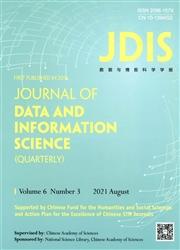Amend: an integrated platform of retracted papers and concerned papers
IF 1.5
3区 管理学
Q2 INFORMATION SCIENCE & LIBRARY SCIENCE
引用次数: 0
Abstract
Purpose The notable increase in retraction papers has attracted considerable attention from diverse stakeholders. Various sources are now offering information related to research integrity, including concerns voiced on social media, disclosed lists of paper mills, and retraction notices accessible through journal websites. However, despite the availability of such resources, there remains a lack of a unified platform to consolidate this information, thereby hindering efficient searching and cross-referencing. Thus, it is imperative to develop a comprehensive platform for retracted papers and related concerns. This article aims to introduce “Amend,” a platform designed to integrate information on research integrity from diverse sources. Design/methodology/approach The Amend platform consolidates concerns and lists of problematic articles sourced from social media platforms (e.g., PubPeer, For Better Science), retraction notices from journal websites, and citation databases (e.g., Web of Science, CrossRef). Moreover, Amend includes investigation and punishment announcements released by administrative agencies (e.g., NSFC, MOE, MOST, CAS). Each related paper is marked and can be traced back to its information source via a provided link. Furthermore, the Amend database incorporates various attributes of retracted articles, including citation topics, funding details, open access status, and more. The reasons for retraction are identified and classified as either academic misconduct or honest errors, with detailed subcategories provided for further clarity. Findings Within the Amend platform, a total of 32,515 retracted papers indexed in SCI, SSCI, and ESCI between 1980 and 2023 were identified. Of these, 26,620 (81.87%) were associated with academic misconduct. The retraction rate stands at 6.64 per 10,000 articles. Notably, the retraction rate for non-gold open access articles significantly differs from that for gold open access articles, with this disparity progressively widening over the years. Furthermore, the reasons for retractions have shifted from traditional individual behaviors like falsification, fabrication, plagiarism, and duplication to more organized large-scale fraudulent practices, including Paper Mills, Fake Peer-review, and Artificial Intelligence Generated Content (AIGC). Research limitations The Amend platform may not fully capture all retracted and concerning papers, thereby impacting its comprehensiveness. Additionally, inaccuracies in retraction notices may lead to errors in tagged reasons. Practical implications Amend provides an integrated platform for stakeholders to enhance monitoring, analysis, and research on academic misconduct issues. Ultimately, the Amend database can contribute to upholding scientific integrity. Originality/value This study introduces a globally integrated platform for retracted and concerning papers, along with a preliminary analysis of the evolutionary trends in retracted papers.修正:被撤论文和相关论文的综合平台
目的 撤稿论文的显著增加引起了各利益相关方的极大关注。目前,各种来源都在提供与研究诚信相关的信息,包括社交媒体上表达的担忧、论文加工厂披露的名单,以及可通过期刊网站访问的撤稿通知。然而,尽管有这些资源,但仍然缺乏一个统一的平台来整合这些信息,从而阻碍了高效搜索和交叉引用。因此,为被撤论文及相关问题开发一个综合平台势在必行。本文旨在介绍 "Amend",一个旨在整合不同来源的研究诚信信息的平台。设计/方法/途径 Amend平台整合了来自社交媒体平台(如PubPeer、For Better Science)、期刊网站撤稿通知和引文数据库(如Web of Science、CrossRef)的关注问题和问题文章清单。此外,Amend 还包括行政机构(如国家自然科学基金委员会、教育部、科技部、中科院)发布的调查和处罚公告。每篇相关论文都有标记,并可通过提供的链接追溯到其信息来源。此外,Amend 数据库还包含被撤论文的各种属性,包括引文主题、资助详情、开放获取状态等。撤稿的原因会被识别并归类为学术不端行为或诚实错误,并提供详细的子类别以进一步澄清。研究结果 在Amend平台上,共发现了32515篇在1980年至2023年间被SCI、SSCI和ESCI收录的撤稿论文。其中,26620 篇(81.87%)与学术不端行为有关。撤稿率为每万篇论文 6.64 篇。值得注意的是,非金牌开放存取文章的撤稿率与金牌开放存取文章的撤稿率明显不同,而且这种差距逐年扩大。此外,撤稿的原因已从传统的个人行为,如篡改、捏造、抄袭和复制,转变为更有组织的大规模欺诈行为,包括造纸厂(Paper Mills)、虚假同行评议(Fake Peer-review)和人工智能生成内容(AIGC)。研究局限性 Amend 平台可能无法完全捕捉到所有被撤回的论文和相关论文,从而影响了其全面性。此外,撤稿通知的不准确性可能会导致标记原因的错误。实际意义 Amend 为利益相关者提供了一个综合平台,以加强对学术不端行为问题的监测、分析和研究。最终,Amend 数据库可为维护科学诚信做出贡献。原创性/价值 本研究为被撤论文和相关论文引入了一个全球整合平台,并对被撤论文的演变趋势进行了初步分析。
本文章由计算机程序翻译,如有差异,请以英文原文为准。
求助全文
约1分钟内获得全文
求助全文
来源期刊

Journal of Data and Information Science
INFORMATION SCIENCE & LIBRARY SCIENCE-
CiteScore
3.50
自引率
6.70%
发文量
495
期刊介绍:
JDIS devotes itself to the study and application of the theories, methods, techniques, services, infrastructural facilities using big data to support knowledge discovery for decision & policy making. The basic emphasis is big data-based, analytics centered, knowledge discovery driven, and decision making supporting. The special effort is on the knowledge discovery to detect and predict structures, trends, behaviors, relations, evolutions and disruptions in research, innovation, business, politics, security, media and communications, and social development, where the big data may include metadata or full content data, text or non-textural data, structured or non-structural data, domain specific or cross-domain data, and dynamic or interactive data.
The main areas of interest are:
(1) New theories, methods, and techniques of big data based data mining, knowledge discovery, and informatics, including but not limited to scientometrics, communication analysis, social network analysis, tech & industry analysis, competitive intelligence, knowledge mapping, evidence based policy analysis, and predictive analysis.
(2) New methods, architectures, and facilities to develop or improve knowledge infrastructure capable to support knowledge organization and sophisticated analytics, including but not limited to ontology construction, knowledge organization, semantic linked data, knowledge integration and fusion, semantic retrieval, domain specific knowledge infrastructure, and semantic sciences.
(3) New mechanisms, methods, and tools to embed knowledge analytics and knowledge discovery into actual operation, service, or managerial processes, including but not limited to knowledge assisted scientific discovery, data mining driven intelligent workflows in learning, communications, and management.
Specific topic areas may include:
Knowledge organization
Knowledge discovery and data mining
Knowledge integration and fusion
Semantic Web metrics
Scientometrics
Analytic and diagnostic informetrics
Competitive intelligence
Predictive analysis
Social network analysis and metrics
Semantic and interactively analytic retrieval
Evidence-based policy analysis
Intelligent knowledge production
Knowledge-driven workflow management and decision-making
Knowledge-driven collaboration and its management
Domain knowledge infrastructure with knowledge fusion and analytics
Development of data and information services
 求助内容:
求助内容: 应助结果提醒方式:
应助结果提醒方式:


